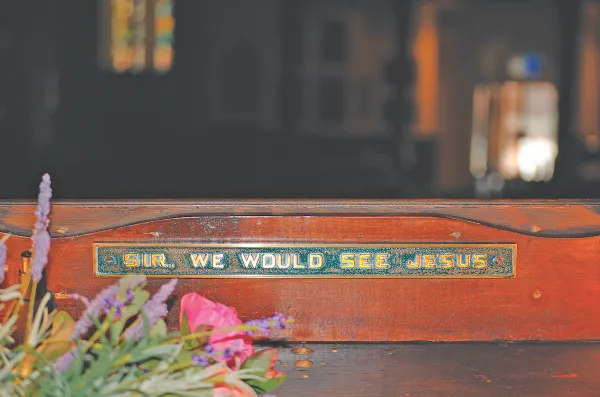Here, There, or Everywhere?

🎧 Prefer to listen instead of read?
Here's the audio version of this article on my new podcast!
A Call for Humility in an Age of Overgeneralization
A Joke at a Funeral
I recently officiated a funeral for a friend.
It was a sad, but beautiful service—honest, heartfelt, and filled with love. And pain. But spiritually speaking, I think it’s fair to say that more than 90% of the people in attendance were not Christians. That doesn’t make them bad people, of course—but it did make me aware that I was speaking to a room where my faith, and that of the deceased, wasn’t widely shared. So I tried to speak plainly and pastorally, clear about the hope of the Gospel, without assuming agreement.
After the service, we gathered for a reception. The food was incredible. [Mental note: Whatever my funeral looks like, the food had better be awesome.] Anyway – as I sat down with my plate, I struck up a conversation with a man who seemed visibly nervous to be talking to a pastor. So I kept it light. Just human. It seems that helped — perhaps helped a bit too much... because pretty soon, he decided to tell me a joke...
I won’t repeat the joke here. Or ever. But boy, was it awkward. Suffice it to say, it involved sexual abuse by a clergyman.
In that (very "cringe" as the kids say) moment, I was at a crossroads. How do I respond?
I chose to laugh—awkwardly, gregariously—shaking my head and quickly changing the subject.
Now, I realize starting an article with this story is risky. It might derail the point I’m trying to make. We might be tempted to start questioning whether a topic like abuse should ever be an appropriate subject for humor, and what should and should not be protected by free speech laws. – That’s not the point.
The point is this: At that moment, perhaps I could have jumped up and demanded, “HEY. You’re not suggesting I, a pastor, am involved in abuse, are you?” And I could have kept going: “We have a robust security camera system at our church. Would you like to review the 24/7 archive? That sort of thing does not happen. How DARE you imply that it does!”
But here’s the problem – Besides the fact that, distasteful as I personally found it, he was just trying to be funny –
It does happen. Far too often. Tragically, there are confirmed cases—too many to count—of clergy of all convictions, from Catholic priests to megachurch evangelicals, involved in horrific sexual crimes.
The fact that I'm not personally doing this does not give me the platform to claim it isn't happening anywhere at all.
What’s True—and What’s Also True
That moment at the funeral table reminded me just how delicate these conversations are.
Because here’s the reality:
Not all churches are covering up abuse.
But some are.
Not every public school teacher is using the classroom to push a sexual agenda.
But some are.
Not every white police officer is out to target Black citizens.
But some are.
Not every undocumented immigrant is a repeat violent offender.
But some are.
And in every case, there’s a dangerous temptation to swing hard in one of two polar opposite directions — to exaggerate and universalize the problem, or deny it outright and altogether.
You’ve probably seen both:
- One person posts a heartbreaking story from there—a church scandal, a violent arrest, a classroom controversy—and someone from here immediately replies, “That’s not happening. Not where I live. That’s just a fake-news media narrative. You bigot.”
- Another person sees a single story—or hears one alarming podcast—and declares, “It’s everywhere. Every church is corrupt. Every cop is a threat. Every teacher’s a groomer. Every undocumented immigrant belongs to MS13.”
And before we've even tried to talk to each other, there’s already no conversation left to be had.
It’s tempting to let our personal lens define the world. But the truth is often more complicated than what we’ve seen. Something can be real somewhere, even if it’s not happening here. And just because something happened somewhere doesn’t mean it’s happening everywhere.
So what if the only way to find out what’s real is to… wait for it… actually listen to each other?
Here, There, or Everywhere?
Part of the problem is that in the internet age, “the news” isn’t just about our neighborhood, our county, or even our state anymore.
It’s about everywhere—every headline, every controversy, every crisis, from every corner of the planet, all at once.
So when we hear about something troubling, we’re left with a disorienting question:
- Is this just something that happened here—in one isolated place?
- Is it happening there—in some other community, some other state, some other context?
- Or is it happening everywhere—a national or global pattern we need to confront?
And depending on which of those words someone is operating from—here, there, or everywhere—their response can be dramatically different.
But there’s another layer, too. A deeper force shaping how we answer that question.
The Algorithm of Anger
Click by click, swipe by swipe, hour by hour, we feed ourselves into the machine — a billion-dollar outrage industry that thrives on one message:
This thing you just saw? It’s not an isolated incident. It’s everywhere. It’s a five-alarm fire. And if you’re not furious, you’re part of the problem.
And those idiots on the other side?
They’re not just blind. They’re brainwashed. Or worse — complicit.
“Can you believe these people?!”
Meanwhile, the "other side" is being served a different special:
“That’s not happening.”
“Okay, fine — maybe one bizarre case. A unicorn. A statistical blip.”
“But if they actually believe that stuff? Yikes. Tinfoil hat alert.”
“And honestly, they’re not just wrong — they’re dangerous. Probably racist. Definitely phobic. Almost certainly morally bankrupt.”
And with that, both sides log off feeling victorious… and vindicated.
No one listened.
No one learned.
But everyone got a dopamine hit and a fresh load of ammo for the next online battle.
A Better Way Forward
So what do we do?
If we know the problem isn’t just what’s happening, but where it’s happening—
And if we know the loudest voices profit (literally) from either panic or denial—
Then maybe the next move isn’t to double down and shout louder.
Maybe it’s to sit down. And ask a question.
And actually listen to someone who sees things differently.
Because here’s what’s at stake:
When someone says, “This is happening,” and we say, “No, it’s not”—we’re not just disagreeing. We might be alienating our neighbors, and undermining their lived experience simply because it doesn’t match ours.
And when we take one incident and declare it’s happening everywhere, without nuance or context, we might be unintentionally slandering whole groups of people—creating fear, rather than clarity.
So… is it happening?
In some places — yes.
In others — no.
And the only way we’ll find out which is which… is if we listen.
That’s why humility matters.
Humility says:
- “I haven’t seen that, but I want to hear you out.”
- “I don’t know if it’s happening everywhere, but I want to understand where it is.”
- “I don’t have the full picture. So let’s talk.”
If we want to be people who tell the truth, we have to be people who are willing to hear the truth—even when it’s uncomfortable, even when it doesn’t fit our narrative, even when it’s happening there but not here.
So let’s be people who don’t assume, don’t exaggerate, and don’t dismiss.
Let’s tell the truth about what’s happening here.
Let’s be willing to hear what’s happening there.
And let’s stop shouting as if we know what’s happening everywhere.
Because reality is often more complicated than what we’ve seen.
And the only way we’ll find out what’s real—is if we listen.
That kind of conversation takes time. It can’t be accomplished in a tweet, a meme, or a comment section.
It takes humility.
It takes the very thing we seem to have become most determined to avoid: relationship.



